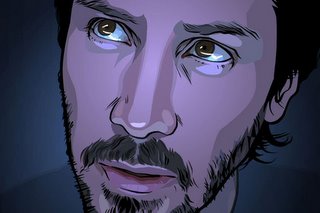A Scanner Darkly

Poor Phillip K. Dick.
He never lived long enough to see his books and short stories made into some of our most enduring and entertaining SciFi films: Blade Runner, Total Recall, Minority Report, Paycheck...well, maybe it's a good thing he's dead.
What many don't know about Dick's life is that it was plagued by rampant drug use and debilitating schizophrenia.
Enter A Scanner Darkly.
A Scanner Darkly is a frustrating movie, even as it is bound to become a cult hit for some. Too talkie to be legitimately entertaining, too dark to be wholly enjoyable and too muddled to be entirely comprehensible, A Scanner Darkly stands as a creative, if unengaging interpretation of its source material. This doesn't necessarily make the film flawed. It speaks more to Dick's pen than the director's camera. That it comes the closest to Dick's addled brain and is, perhaps, the most faithful adaptation of his work is true enough. But, does that alone make it a great film?
A Scanner Darkly tells the bleak, sporadically comedic, and always tragic tale of drug use in an America only a handful of years in the future. 1 in 4 people are mercilessly addicted to "Substance D" (disintegration, despair, death, etc.) which leads to the sort of wild paranoia and freak-outs that puts The Lord of the Ring's Gollum to shame. Keanu Reeves plays an undercover police officer so dependent on the very thing he has pledged his life to eradicate, that he is in danger of losing himself entirely.
The use of rotoscoping--a process that overlays animation overtop live-action photography and was first employed in writer/director Richard Linklater’s maddening but awe-inspiring Waking Life--is perfect for this film. Animation allows such creative freedom and here Linklater uses it to graphically represent the torturous dementia of a mind fried on drugs.
But the film is more than just a commentary on the pervasiveness and destructiveness of addictive narcotics. It is a commentary on the miseries of life and a person's inability to know and understand the one individual who should be an open book--themselves. How much more impossible a task when the investigative instruments are dulled and rotted by foreign substances? Governments may spy on us 24-hours a day but what can a camera diagnose when we cannot fathom ourselves?
"What does a scanner see?" Reeves asks. "Does a scanner see into me—into us—clearly or darkly? I hope it [sees clearly] … because I can't any longer see into myself. If the scanner sees only darkly, the way I myself do, then we are cursed … and we'll wind up dead this way, knowing very little and getting that little fragment wrong too."
A Scanner Darkly is certainly a thoughtful film—challenging, meditative, and sad. Dick would have approved. There is no doubting that it is a timely and relevant parable.
And yet its power may go unnoticed by those who grow weary trying to sit through its meandering conversations and its chorus of dysfunctional fools. No, Linklater was not trying to make an exciting thriller. But he may have made a film too beholden to its source to be palatable.
Still, as a eulogy for Dick's hopeless generation (and how different is that generation from our own?), it is spot on.


1 Comments:
Interestingly, two biopics on Dick's life are in the works, one staring Bill Pullman and the other Paul Giamatti.
Post a Comment
<< Home